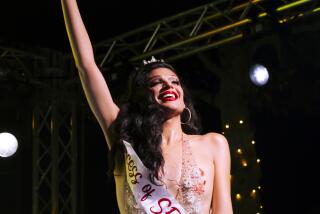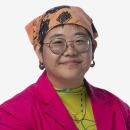WeHo Pride paradegoers talk joy and inclusivity, trans rights and a thread of fear
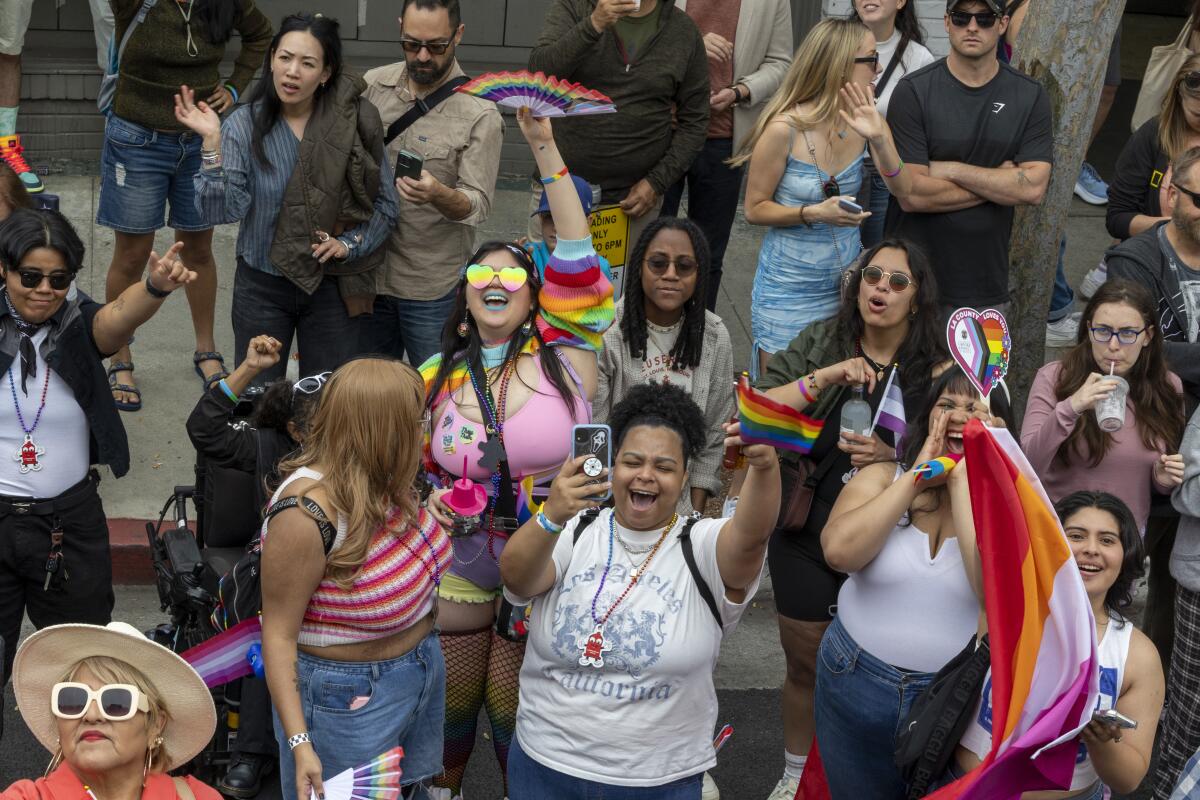
- Share via
The sun was tucked away, but the cheeks were out Sunday at the West Hollywood Pride Parade as go-go dancers in jockstraps and gay cowboys in breezy leather chaps strolled down Santa Monica Boulevard.
Leading the pack was a phalanx of queer bikers ready to rev their engines down a rainbow-swaddled corridor in the heart of L.A.’s iconic gay haven.
West Hollywood local Katrina Vinson has been taking part in the parade for years as the founder of Pride Riders, a collective of lesbian riders. To her, the weekend’s LGBTQ+ festivities were about spotlighting inclusivity.
“WeHo specifically tends to be a Boystown,” said Vinson, speaking of West Hollywood’s reputation as primarily a hot spot for affluent white gay men. “It’s really important for there to be visibility of gay women and nonbinary [people].”
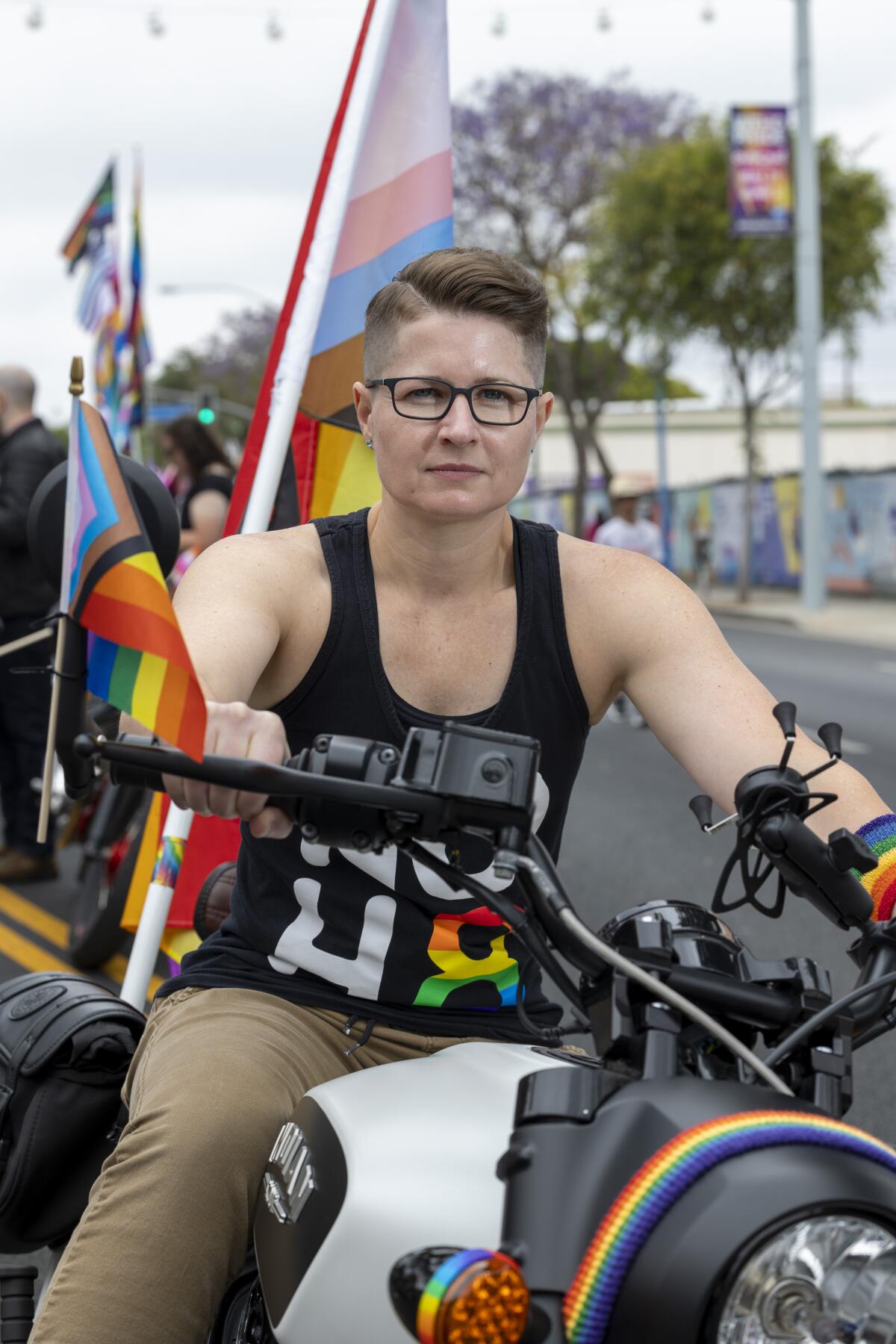
All along the parade route, people waved iterations of flags representing those who are asexual, trans or lesbian — Mexican flags with rainbow stripes signaled pride at intersectional identities.
Local restaurants capitalized on the street traffic, opening their storefronts to the sidewalk to serve beverages and eats to hungry and thirsty pedestrians and their canine companions. Other businesses used the parade as an advertising opportunity.
“Take Pride in your flex-uality,” read Crunch’s pithy float as it promoted the fitness franchise.
A filmmaking crew took advantage of the picturesque setting to film a scene for the biopic “Trust Me, I’m a Doctor,” about former Playboy model Anna Nicole Smith. Abbie Cornish, as Smith, wore a sleek silver dress and sat atop a convertible across from costar Kal Penn, who plays Smith’s doctor Sandeep Kapoor.
Although West Hollywood Pride definitely has a commercial side, Hollywood resident Tim Armitage said he’d noticed a shift in recent years toward a more local vibe, with a greater focus on nonprofits and service organizations. In 2020, West Hollywood and L.A. Pride split, resulting in two weekend festivals that have to compete for headline acts and corporate sponsorships. With two parades, there’s more space for neighborhood groups to shine.
“It feels a lot more authentic,” said the marketing strategist, who has lived in Los Angeles for 22 years. Armitage identifies as gay and says parade organizers have expanded the event’s scope, better ensuring that communities under the LGBTQIA+ umbrella are represented. “It gets better and better every year.”
But it wasn’t all rainbows and fun. This year, several organizations made a pointed effort to call attention to current political events locally and globally.
With calls for housing justice as well as a campaign to pass the Equal Rights Act — the social-justice roots of Pride were a through line amid the joyful celebration of diversity.
A group of Indigenous queer people marched in traditional regalia while waving a Mexican flag and prominently displaying a Palestinian flag on the bumper of their truck that said, “Free Palestine.”
“It is our belief that the Pride festival and the whole Pride event was a protest itself. It was a revolt. And we’re here and continuing that spirit of fighting for civil rights,” said Ozomatli Xochipilli. He added they were nearly barred by a parade official and law enforcement from participating in the parade because their political banner reflected support for Palestinians in the deadly Israel-Hamas war.
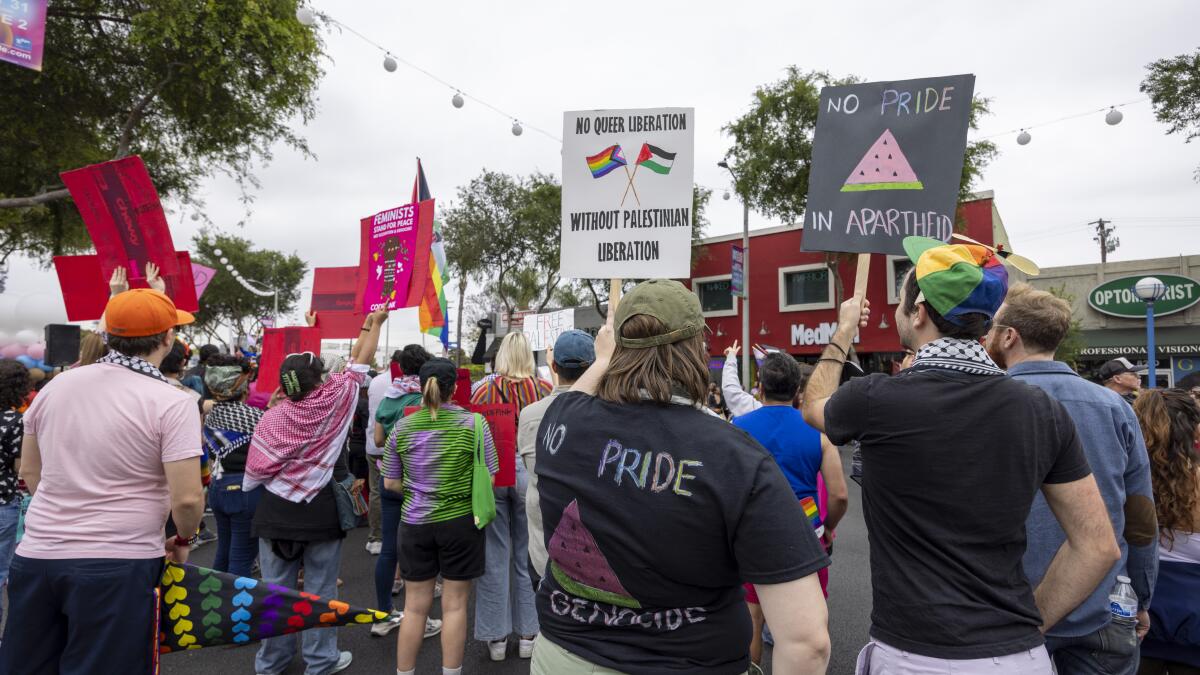
A few dozen protesters clad in kaffiyehs demonstrated along the sidelines of the parade, corralled by Los Angeles County sheriff’s deputies. “No pride in apartheid,” read one sign. Another read, “No queer liberation without Palestinian liberation.”
Despite the peaceful nature of the event, some paradegoers expressed an undercurrent of fear, citing political backlash affecting the transgender community. Last year during Pride Month, the Supreme Court voted 6 to 3 to affirm the right of a web designer to refuse services to same-sex couples even as states including Florida and Tennessee considered laws banning drag performances.
And in April, The Times reported bomb threats against the TransLatin@ Coalition, which provides services for transgender and gender-nonconforming Latino communities.
But that didn’t stop TransLatin@ Coalition, marking its 15th anniversary, from celebrating Pride as well in a quinceañera-themed float, where trans women in bejeweled floor-length gowns danced to reggaeton and cumbia.
The organization offers social services with bilingual assistance and without it training coordinator Bee Curiel says transgender Latinos face greater discrimination as trans people with language barriers. “That just reinforces that our presence is needed and that our community members rely on us,” Curiel said.
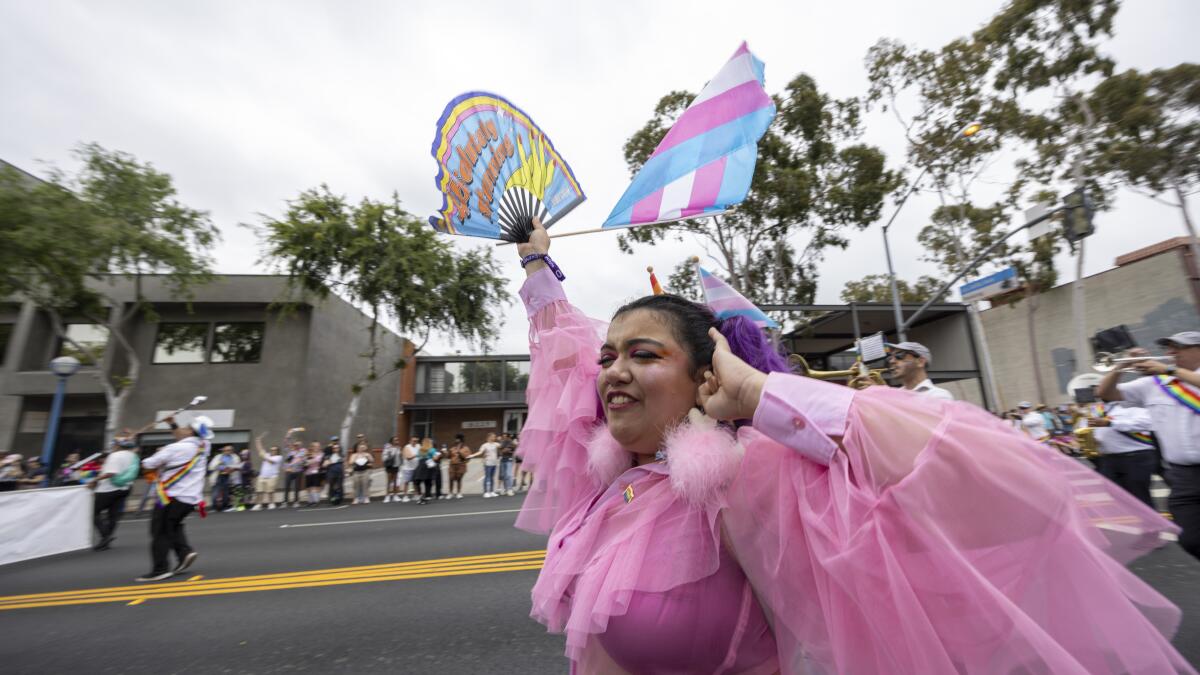
The law firm Carpenter and Zuckerman took a playful jab at current affairs — hiring drag queens to portray a reimagined Supreme Court.
“Drag has become a revolutionary act,” said Carlos Hernandez, a queer trial attorney at the firm. Hernandez said that, in recent years, they’d become increasingly concerned with the number of transgender individuals seeking legal representation after being targeted by law enforcement.
Meanwhile, the law firm made its political point by driving a rainbow-painted Tesla with its Supreme Court in tow to express solidarity with its clients.
Local drag queen Mylique E. Fawcett was tasked last year with representing Justice Ketanji Brown Jackson. This year, Fawcett was invited back to portray an orange-colored Supreme Court justice in a rainbow pantheon of drag queen justices. Her pumpkin-inspired outfit was a provocative look complete with green nail polish, knee high stockings, ivy woven into her ginger wig and a judge’s gavel.
“We are imagining the Supreme Court justice that we deserve and want,” Hernandez said.
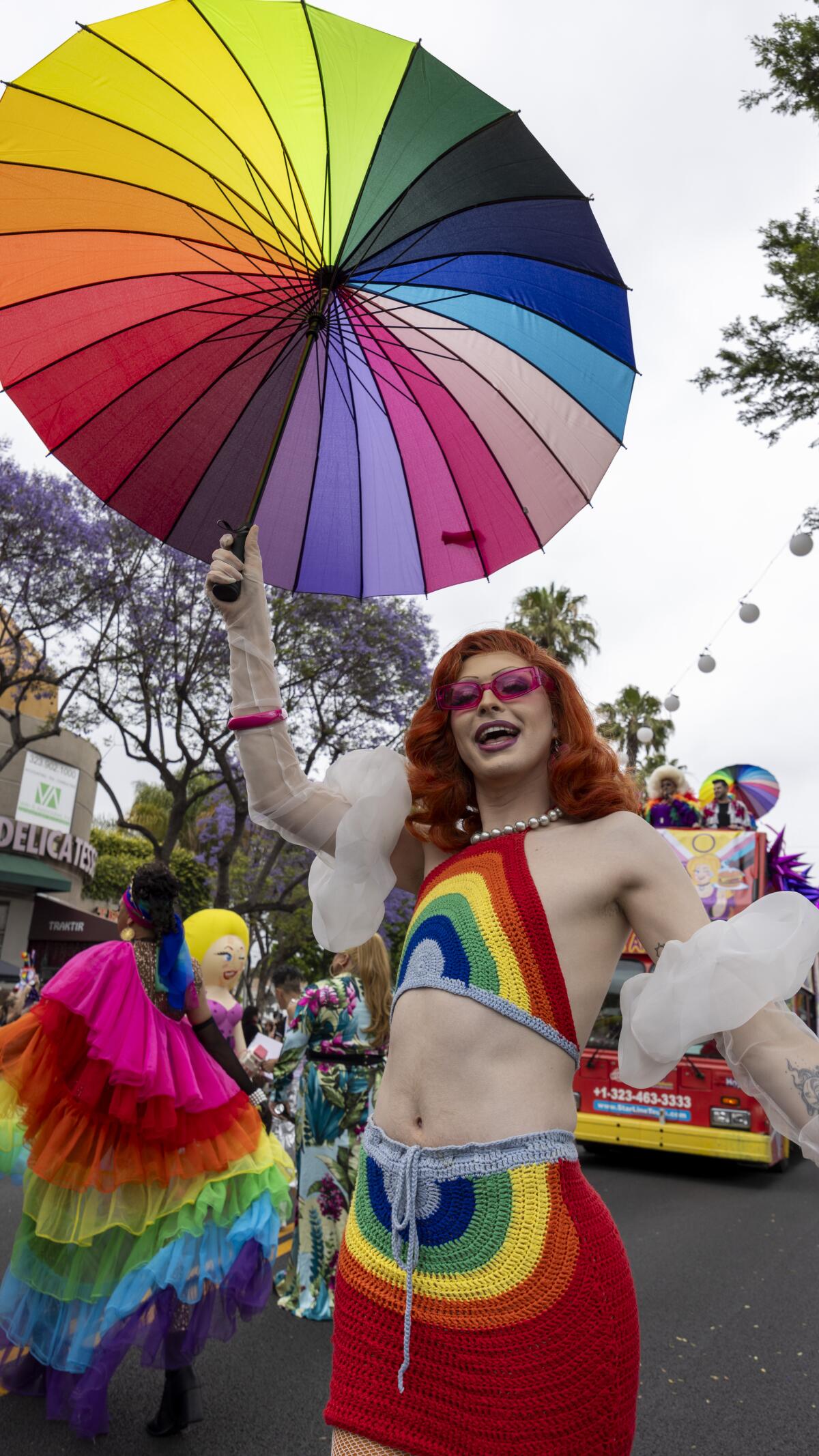
First-time Pride parade attendee and high school sophomore Bumble, a pseudonym, said she was amazed by the atmosphere of acceptance and inclusivity.
“I love drag queens. I look up to them,” said the student from L.A.’s Bernstein High School. Some walked, others drove to the Pride parade. But Bumble rode the bus with their classmate Thierry, who provided just their first name for this interview. Together they held a flag filled with rainbow hearts. “I was bawling my eyes out because this is really a moment for me,” added Bumble.
Although Bumble professes to being loud and proud at her school, she said it’s more difficult for classmates like Thierry. Not all families are accepting.
“I love being here because I had never been out before,” said Thierry, who has struggled to find a way to freely express their queer identity. “But now I can.”
More to Read
Sign up for Essential California
The most important California stories and recommendations in your inbox every morning.
You may occasionally receive promotional content from the Los Angeles Times.

